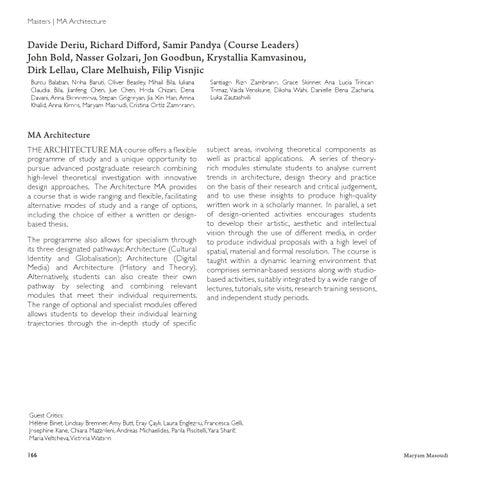Masters | MA Architecture
Davide Deriu, Richard Difford, Samir Pandya (Course Leaders) John Bold, Nasser Golzari, Jon Goodbun, Krystallia Kamvasinou, Dirk Lellau, Clare Melhuish, Filip Visnjic Burcu Balaban, Noha Baruti, Oliver Beasley, Mihail Bila, Iuliana Claudia Bila, Jianfeng Chen, Jue Chen, Hoda Chizari, Dena Davani, Anna Ekonomova, Stepan Grigoryan, Jia Xin Han, Amna Khalid, Anna Kirnos, Maryam Masoudi, Cristina Ortiz Zamorano,
Santiago Rizo Zambrano, Grace Skinner, Ana Lucia Trincao Tomaz, Vaida Venskune, Diksha Wahi, Danielle Elena Zacharia, Luka Zautashvili
MA Architecture The Architecture MA course offers a flexible programme of study and a unique opportunity to pursue advanced postgraduate research combining high-level theoretical investigation with innovative design approaches. The Architecture MA provides a course that is wide ranging and flexible, facilitating alternative modes of study and a range of options, including the choice of either a written or designbased thesis. The programme also allows for specialism through its three designated pathways: Architecture (Cultural Identity and Globalisation); Architecture (Digital Media) and Architecture (History and Theory). Alternatively, students can also create their own pathway by selecting and combining relevant modules that meet their individual requirements. The range of optional and specialist modules offered allows students to develop their individual learning trajectories through the in-depth study of specific
subject areas, involving theoretical components as well as practical applications. A series of theoryrich modules stimulate students to analyse current trends in architecture, design theory and practice on the basis of their research and critical judgement, and to use these insights to produce high-quality written work in a scholarly manner. In parallel, a set of design-oriented activities encourages students to develop their artistic, aesthetic and intellectual vision through the use of different media, in order to produce individual proposals with a high level of spatial, material and formal resolution. The course is taught within a dynamic learning environment that comprises seminar-based sessions along with studiobased activities, suitably integrated by a wide range of lectures, tutorials, site visits, research training sessions, and independent study periods.
Guest Critics: Hélène Binet, Lindsay Bremner, Amy Butt, Eray Çaylı, Laura Englezou, Francesca Gelli, Josephine Kane, Chiara Mazzoleni, Andreas Michaelides, Paola Piscitelli, Yara Sharif, Maria Veltcheva, Victoria Watson 166
Maryam Masoudi
